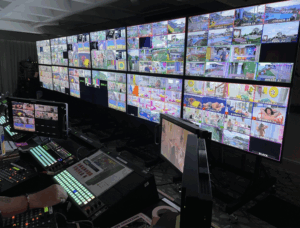
When Jeremy Bentham designed the panopticon, he imagined inmates trapped in a circular prison, constantly visible from the central guard tower but never certain if they were being watched. What he didn’t imagine? A sun-soaked villa in Mallorca, filled with spray-tanned singles competing for love, fame, and a hundred-thousand-dollar prize. Love Island is the panopticon with better bikinis: 73 cameras, hidden microphones, and an invisible production team ensure contestants are always visible. In Love Island’s modern-day panopticon, surveillance becomes entertainment, privacy becomes a thing of the past, and contestants willingly trade autonomy for the possibility of money and fame.
First launched in the United Kingdom in 2005 (and revived in 2015), Love Island strands a group of singles in a luxury villa and films them 24/7. To survive, contestants must “couple up” either romantically or strategically, while the public votes on who stays, who leaves, and who wins the prize money. Phones, internet, clocks? Banned. Time and space itself belong to the villa. It’s part soap opera, part dating app, part Hunger Games–a perfect breeding ground for spectacle and control.
Unlike Bentham’s prisoners, Love Island contestants walk into confinement voluntarily. They hand over their phones, their schedules, and even their sense of time, all for the chance to be seen. Producers operate as the invisible watchtower, quietly shaping narratives from behind remotely operated cameras. The audience acts as the second tower—voting contestants off, crowning winners, and turning unflattering photos into viral memes. The result is a constant self-performance: islanders never know which joke, argument, or intimate moment might make the final cut, so they regulate themselves at all times. What emerges is exhibitionism under hyperdiscipline—exactly the kind of self-surveillance Michel Foucault warned about, now packaged as reality TV with spray tans and infinity pools.
The human cost of this surveillance spectacle has been devastating. Caroline Flack, the show’s host from 2015 to 2019, died by suicide in 2020. Contestants Sophie Gradon (2016) and Mike Thalassitis (2017) also committed suicide after their time on the show, sparking public outrage over the toll of constant visibility, sudden fame, and relentless online abuse. In response, producers now laud “duty of care” measures like therapy sessions, post-show check-ins, and promises of support—but critics argue these band-aid fixes miss the deeper point: the show is engineered to generate pressure, conflict, and humiliation because that’s what keeps viewers glued to their screens.
But Love Island’s significance goes far beyond the villa. It mirrors a broader cultural shift in which surveillance is not only normalized but welcomed. Islanders curate themselves for cameras in hopes of fame or romance, just as ordinary people curate themselves on Instagram, TikTok, or dating apps. The villa isn’t a bizarre exception to reality. It’s a distilled version of our everyday lives in the attention economy. Love Island shows us that visibility is both currency and captivity, intimacy is content, and privacy is expendable. We may laugh at the absurdity of the villa, but the truth is harder to swallow: we’re all in the villa now.







